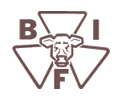Advancements in Genetic Prediction
International Collaboration on Genomics of Economically Relevant Traits
Abstract:
An international collaboration is attempting to make better use of high-density SNP information by combining each contributor’s results. The initial group of collaborators are from Australia (CRC for Beef Genetic Technologies), Canada (a joint contribution from the Universities of Alberta and Guelph), and the United States (USDA-ARS, U.S. Meat Animal Research Center). Each collaborator has a large group of phenotyped animals that are genotyped for approximately 50,000 SNP. Most phenotypes are for weights, carcass measurements and feed intake and measured by two or three of the groups. Even with these resources, some traits may not have enough data to yield reliable results. Each group is analyzing their own data and sharing the results. Comparing these results across the different environments and germplasm represented in the collaboration should evaluate their reliability.
Comparisons of both individual SNP effects and genetic predictions based on multiple SNPs are being made. Weight trait data are most numerous. The collaborators expect to learn a great deal about how to apply the technology most effectively from these traits. That knowledge should allow evaluation of how to more efficiently utilize traits with limited numbers phenotypes or genotypes.
Opportunities to expand the collaboration to other public and private groups having genotypes and phenotypes are being pursued. The intent of expanding the collaboration is to further test the reliability of weight, carcass, and feed intake SNP associations and predictions and to expand to female reproduction traits.
Editor’s Note: The above material is provided by and posted with permission of the Beef Improvement Federation. Please direct reprint requests to BIF via the “Contact BIF” page at www.beefimprovement.org.



